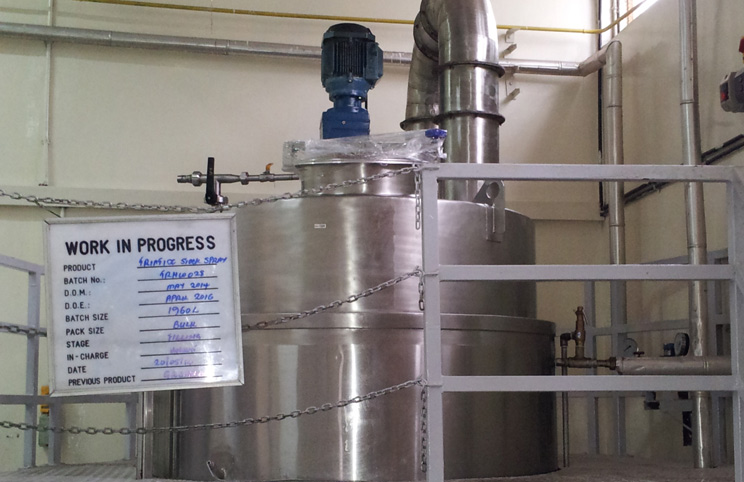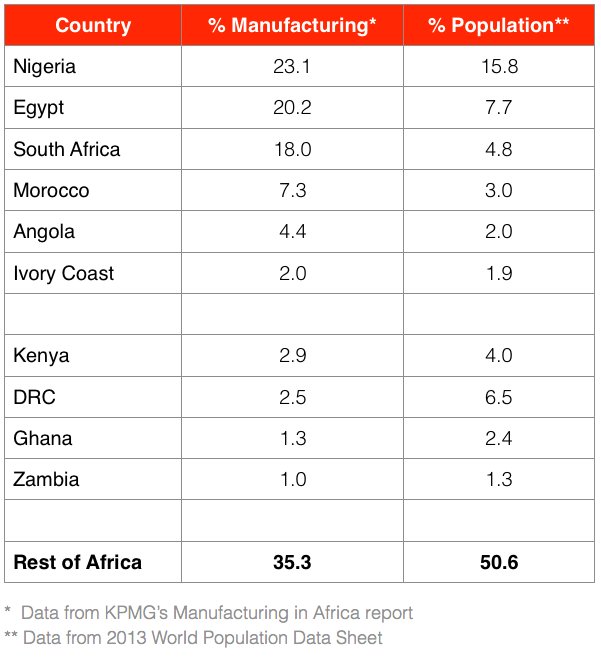Lagos is full of street vendors (see an earlier post about their frenzy activity!). It can get overwhelming! One of my Nigerian friends explained to me “Yeah! We’re traders! There’s hardly any manufacturing, and there are historical reasons for this: the Brits were interested in selling overseas what they manufactured at home…” This seems to be an important reason for the lack of early investment in manufacturing industries.
Has the picture changed in recent times? Not much. KPMG released recently a sector report on Manufacturing in Africa: manufacturing in Africa accounts for 1.5 % that of the world. Compare this to Africa’s 15.4 % share of the world population .

Let’s take a look at some countries, and their share of Africa’s totals. Data refers to 2013 (as in KPGM’s report). At the top of the table are countries whose share of manufacturing is higher than that of population, and at the bottom the others:

A country like Nigeria – the most populous one in the continent – represents 2.4 % of the world’s population and only 0.35 % of the manufacturing output. My usual caveat here: these statistics do not account for manufacturing activities in the informal sector. Some estimations indicate it may represent 30-60% of GNP in some African countries. Still, visual observation indicates that there’s more trade than manufacturing – I Nigeria and in most other countries in Africa.
There are many readings to this picture. They range from pessimistic views (“there’s no way to have “normal” operations there…”) to optimistic ones (“the continent is ripe for new investments”). If you’ve been following this blog, you know that I lean towards the optimistic side. This is not to say that I oversee difficulties: they are there (from insufficient infrastructures to corruption to…). But so are the opportunities for those willing to take the risk, aren’t they?


Thanks, Africa!
I so much like your idea of “willing to take risk(s)”. I am sure you’re familiar with a say in Africa which says: “If you want to go fast, go alone; but, if you want to go far, let’s work together”. The idea of working together could be a weapon to mitigate risk(s) but also how to navigate the so many complexities in some African context!
Aloys
I agree with you, Aloys. In fact, the uncertainty that those complexities entail for outsiders contribute increasing their risk — btw, I don’t intend to initiate here an academic discussion about how risk and uncertainty relate!
Very, very interesting post. I think that a different approach should be taken into consideration between the french & spanish countries and the english speaking ones. Having travelled quite extensively in french speaking countries during the last 15 years, I have never seen nor experienced true succes stories in manufacturing areas. One of the reasons are that they have not been able yet to cut their ties with their former colonisators in the sense that they still expect them to take the lead & assume the risks. It is a question of mentality. How many times havent’t I been confronted to this key issue? Also to be taken into consideration the fact that the very few entrepreneurs I have met fear to be phagocitated by their families in case of success.
Marc-Henry, thank you for this new angle. Each former colony left a different legacy in their territories, and that needs to be taken into account.
I think the other issue of fears of others learning about entrepreneur’s’ success cuts across the board. It relates to the communal mentality which has both healthy and unhealthy consequences